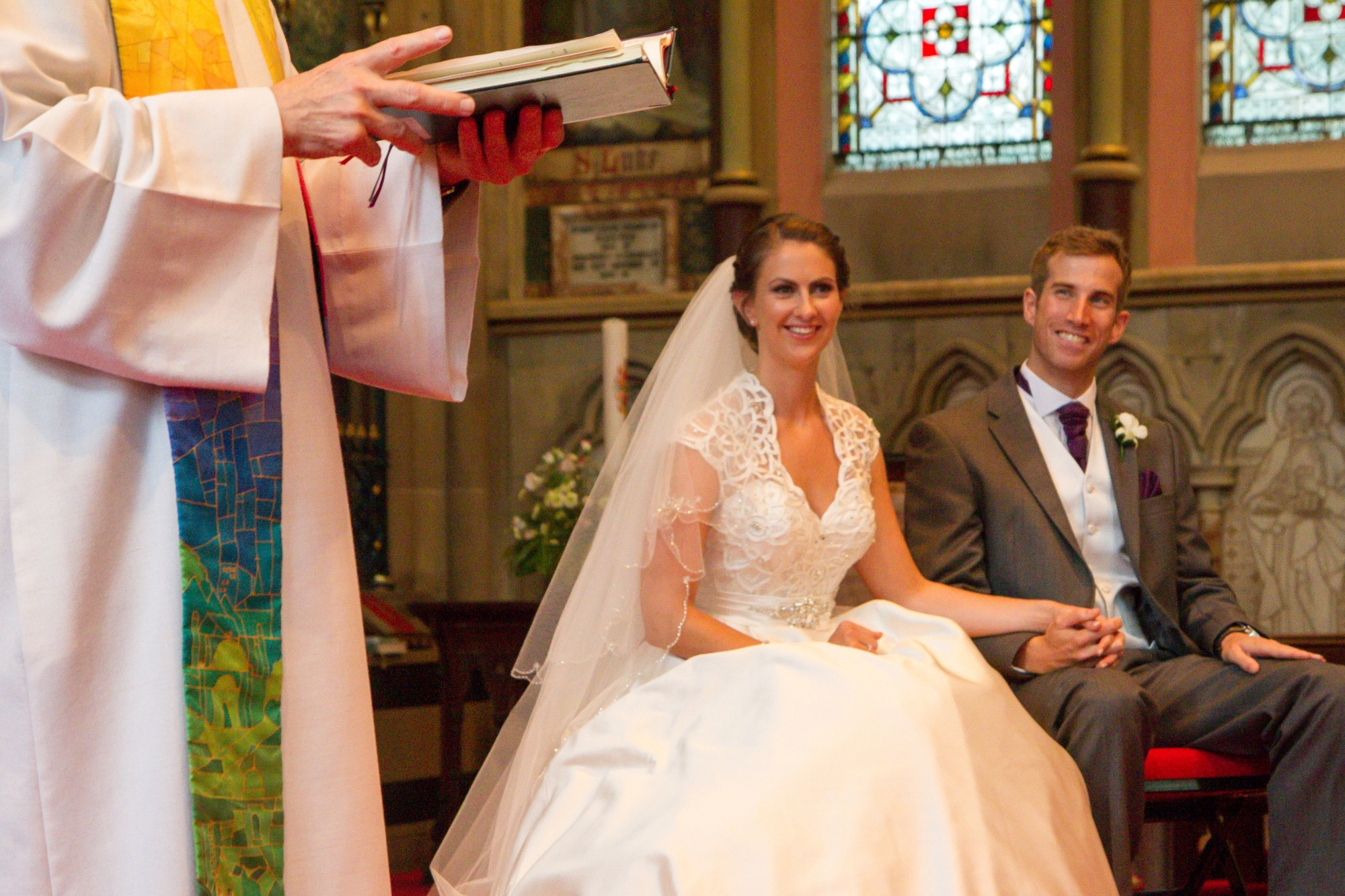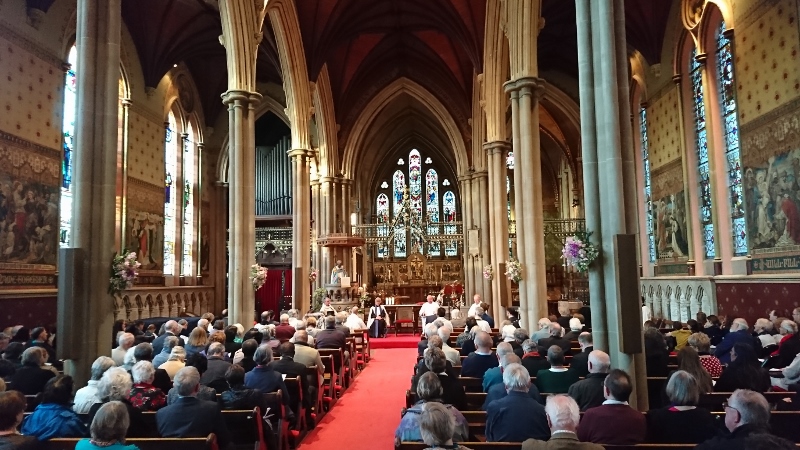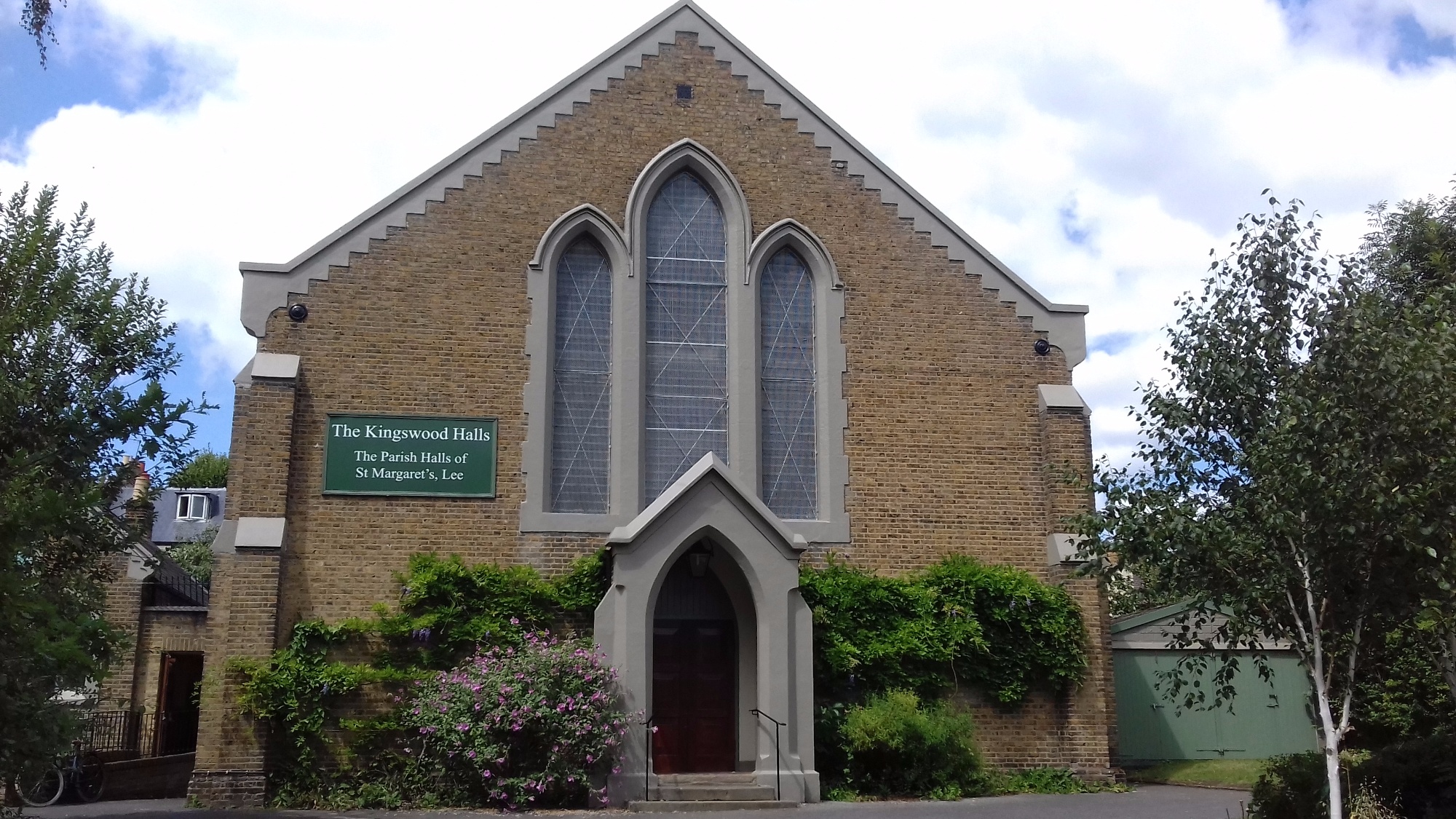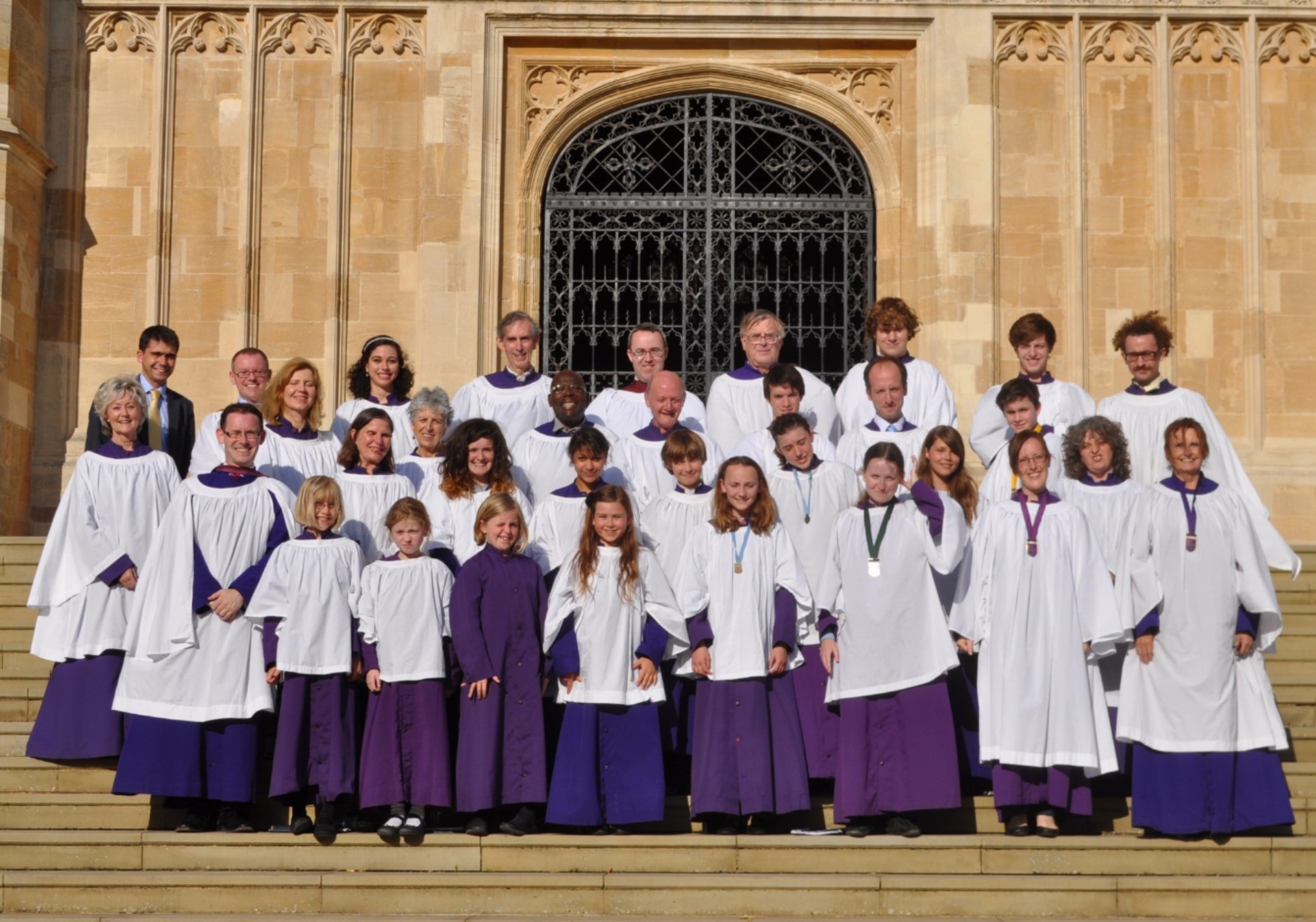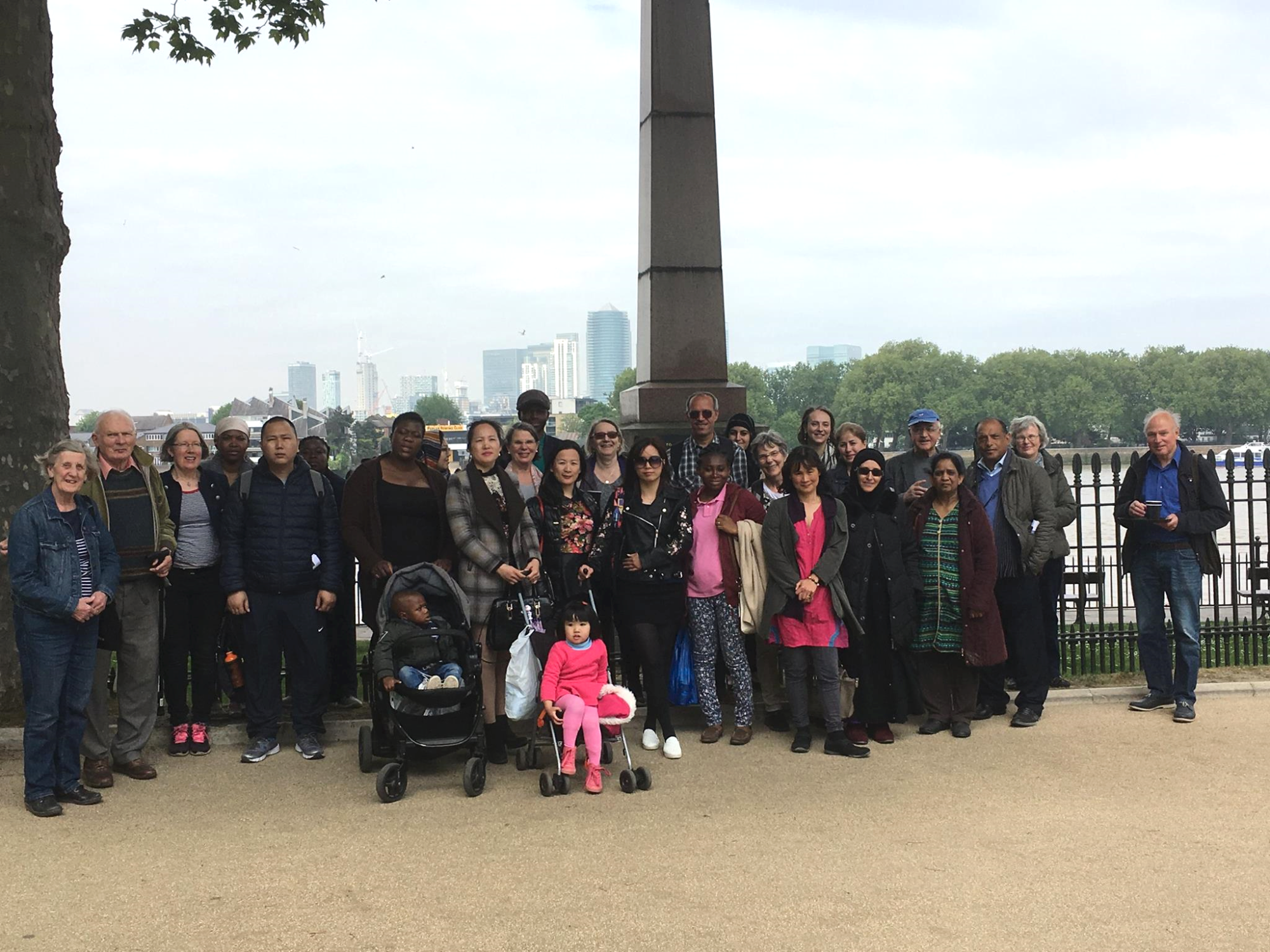Privacy Policy
GENERAL PRIVACY NOTICE (NON ROLE HOLDERS)
Your personal data – what is it?
“Personal data” is any information about a living individual which allows them to be identified from that data (for example a name, photographs, videos, email address, or address). Identification can be by the information alone or in conjunction with any other information. The processing of personal data is governed by [the Data Protection Bill/Act 2017 the General Data Protection Regulation 2016/679 (the “GDPR”) and other legislation relating to personal data and rights such as the Human Rights Act 1998].
Who are we?
This Privacy Notice is provided to you by the Parochial Church Council (PCC) of St Margaret’s Church, Lee which is the data controller for your data.
The Church of England is made up of a number of different organisations and office-holders who work together to deliver the Church’s mission in each community. The PCC works together with:
- the incumbent of the parish (that is, our Rector);
- the bishops of the Diocese of Southwark; and
- the Diocese of Southwark, which is responsible for the financial and administrative arrangements for the Diocese of Southwark.
As the Church is made up of all of these persons and organisations working together, we may need to share personal data we hold with them so that they can carry out their responsibilities to the Church and our community. The organisations referred to above are joint data controllers. This means we are all responsible to you for how we process your data.
Each of the data controllers have their own tasks within the Church and a description of what data is processed and for what purpose is set out in this Privacy Notice. This Privacy Notice is sent to you by the PCC on our own behalf and on behalf of each of these data controllers. In the rest of this Privacy Notice, we use the word “we” to refer to each data controller, as appropriate.
What data do the data controllers listed above process? They will process some or all of the following where necessary to perform their tasks:
- Names, titles, and aliases, photographs;
- Contact details such as telephone numbers, addresses, and email addresses;
- Where they are relevant to our mission, or where you provide them to us, we may process demographic information such as gender, age, date of birth, marital status, nationality, education/work histories, academic/professional qualifications, hobbies, family composition, and dependants;
- Where you make donations or pay for activities such as use of a church hall, financial identifiers such as bank account numbers, payment card numbers, payment/transaction identifiers, policy numbers, and claim numbers;
- The data we process is likely to constitute sensitive personal data because, as a church, the fact that we process your data at all may be suggestive of your religious beliefs. Where you provide this information, we may also process other categories of sensitive personal data: racial or ethnic origin, sex life, mental and physical health, details of injuries, medication/treatment received, political beliefs, labour union affiliation, genetic data, biometric data, data concerning sexual orientation and criminal records, fines and other similar judicial records.
How do we process your personal data?
The data controllers will comply with their legal obligations to keep personal data up to date; to store and destroy it securely; to not collect or retain excessive amounts of data; to keep personal data secure, and to protect personal data from loss, misuse, unauthorised access and disclosure and to ensure that appropriate technical measures are in place to protect personal data.
We use your personal data for some or all of the following purposes:
- To enable us to meet all legal and statutory obligations (which include maintaining and publishing our electoral roll in accordance with the Church Representation Rules);
- To carry out comprehensive safeguarding procedures (including due diligence and complaints handling) in accordance with best safeguarding practice from time to time with the aim of ensuring that all children and adults-at-risk are provided with safe environments;
- To minister to you and provide you with pastoral and spiritual care (such as visiting you when you are gravely ill or bereaved) and to organise and perform ecclesiastical services for you, such as baptisms, confirmations, weddings and funerals;
- To deliver the Church’s mission to our community, and to carry out any other voluntary or charitable activities for the benefit of the public as provided for in the constitution and statutory framework of each data controller;
- To administer the parish, deanery, archdeaconry and diocesan membership records;
- To fundraise and promote the interests of the Church and charity;
- To maintain our own accounts and records;
- To process a donation that you have made (including Gift Aid information);
- To seek your views or comments;
- To notify you of changes to our services, events and role holders;
- To send you communications which you have requested and that may be of interest to you. These may include information about campaigns, appeals, other fundraising activities;
- To process a grant or application for a role;
- To enable us to provide a voluntary service for the benefit of the public in a particular geographical area as specified in our constitution;
- Our processing also includes the use of CCTV systems for the prevention and prosecution of crime.
What is the legal basis for processing your personal data?
Most of our data is processed because it is necessary for our legitimate interests, or the legitimate interests of a third party (such as another organisation in the Church of England). An example of this would be our safeguarding work to protect children and adults at risk. We will always take into account your interests, rights and freedoms.
Some of our processing is necessary for compliance with a legal obligation. For example, we are required by the Church Representation Rules to administer and publish the electoral roll, and under Canon Law to announce forthcoming weddings by means of the publication of banns.
We may also process data if it is necessary for the performance of a contract with you, or to take steps to enter into a contract. An example of this would be processing your data in connection with the hire of church facilities.
Religious organisations are also permitted to process information about your religious beliefs to administer membership or contact details.
Where your information is used other than in accordance with one of these legal bases, we will first obtain your consent to that use.
Sharing your personal data
Your personal data will be treated as strictly confidential. It will only be shared with third parties where it is necessary for the performance of our tasks or where you first give us your prior consent. It is likely that we will need to share your data with some or all of the following (but only where necessary):
- The appropriate bodies of the Church of England including the other data controllers;
- Our agents, servants and contractors. For example, we may ask a commercial provider to send out newsletters on our behalf, or to maintain our database software;
- Other clergy or lay persons nominated or licensed by the bishops of the Diocese of Southwark to support the mission of the Church in our parish. For example, our clergy are supported by our area dean and archdeacon, who may provide confidential mentoring and pastoral support. Assistant or temporary ministers, including curates, deacons, licensed lay ministers, commissioned lay ministers or persons with Bishop’s Permissions may participate in our mission in support of our regular clergy;
- Other persons or organisations operating within the Diocese of Southwark including, where relevant, the Southwark Diocesan Board of Education, Southwark Cathedral and Subsidiary Bodies;
- There may be other legal entities we share data with within the Church of England who are also data controllers;
- On occasion, other churches with which we are carrying out joint events or activities.
How long do we keep your personal data?
We will keep some records permanently if we are legally required to do so. We may keep some other records for an extended period of time. For example, it is current best practice to keep financial records for a minimum period of 7 years to support HMRC audits. In general, we will endeavour to keep data only for as long as we need it. This means that we may delete it when it is no longer needed.
Your rights and your personal data
You have the following rights with respect to your personal data:
When exercising any of the rights listed below, in order to process your request, we may need to verify your identity for your security. In such cases we will need you to respond with proof of your identity before you can exercise these rights.
1. The right to access information we hold on you
- At any point you can contact us to request the information we hold on you as well as why we have that information, who has access to the information and where we obtained the information from. Once we have received your request we will respond within one month.
- There are no fees or charges for the first request but additional requests for the same data may be subject to an administrative fee.
2. The right to correct and update the information we hold on you
- If the data we hold on you is out of date, incomplete or incorrect, you can inform us and your data will be updated.
3. The right to have your information erased
- If you feel that we should no longer be using your data or that we are illegally using your data, you can request that we erase the data we hold.
- When we receive your request we will confirm whether the data has been deleted or the reason why it cannot be deleted (for example because we need it for our legitimate interests or regulatory purpose(s)).
4. The right to object to processing of your data
- You have the right to request that we stop processing your data. Upon receiving the request we will contact you and let you know if we are able to comply or if we have legitimate grounds to continue to process your data. Even after you exercise your right to object, we may continue to hold your data to comply with your other rights or to bring or defend legal claims.
5. The right to data portability
- You have the right to request that we transfer some of your data to another controller. We will comply with your request, where it is feasible to do so, within one month of receiving your request.
6. The right to withdraw your consent to the processing at any time for any processing of data to which consent was sought.
- You can withdraw your consent easily by telephone, email, or by post (see Contact Details below).
7. The right to object to the processing of personal data where applicable.
8. The right to lodge a complaint with the Information Commissioner’s Office.
Transfer of Data Abroad
Any electronic personal data transferred to countries or territories outside the EEA will only be placed on systems complying with measures giving equivalent protection of personal rights either through international agreements or contracts approved by the European Union. Our website is also accessible from overseas so on occasion some personal data (for example in a newsletter) may be accessed from overseas.
Further processing
If we wish to use your personal data for a new purpose, not covered by this Notice, then we will provide you with a new notice explaining this new use prior to commencing the processing and setting out the relevant purposes and processing conditions. Where and whenever necessary, we will seek your prior consent to the new processing.
Contact Details
Please contact us if you have any questions about this Privacy Notice or the information we hold about you or to exercise all relevant rights, queries or complaints at:
Simon Blackburn, Chair of St Margaret's PCC
Email: sblackburn@doctors.org.uk
You can contact the Information Commissioners Office on 0303 123 1113 or via email https://ico.org.uk/global/contact-us/email/ or at:
Information Commissioner's Office, Wycliffe House, Water Lane, Wilmslow, Cheshire, SK9 5AF
PRIVACY NOTICE (ROLE HOLDERS)
e.g. Churchwardens, PCC Secretaries, PCC Treasurers, Deanery Synod reps, Safeguarding officers etc.
Your personal data – what is it?
“Personal data” is any information about a living individual which allows them to be identified from that data (for example a name, photographs, videos, email address, or address). Identification can be by the information alone or in conjunction with any other information. The processing of personal data is governed by [the Data Protection Bill/Act 2017 the General Data Protection Regulation 2016/679 (the “GDPR”) and other legislation relating to personal data and rights such as the Human Rights Act 1998].
Who are we?
This Privacy Notice is provided to you by the Parochial Church Council (PCC) of St Margaret’s Church, Lee which is the data controller for your data.
The Church of England is made up of a number of different organisations and office-holders who work together to deliver the Church’s mission in each community. The PCC works together with:
- the incumbent of the parish (that is, our Rector);
- the bishops of the Diocese of Southwark; and
- the Diocese of Southwark, which is responsible for the financial and administrative arrangements for the Diocese of Southwark.
As the Church is made up of all of these persons and organisations working together, we may need to share personal data we hold with them so that they can carry out their responsibilities to the Church and our community. The organisations referred to above are joint data controllers. This means we are all responsible to you for how we process your data.
Each of the data controllers has their own tasks within the Church and a description of what data is processed and for what purpose is set out in this Privacy Notice. This Privacy Notice is sent to you by the PCC on our own behalf and on behalf of each of these data controllers. In the rest of this Privacy Notice, we use the word “we” to refer to each data controller, as appropriate.
How do we process your personal data?
The data controllers will comply with their legal obligations to keep personal data up to date; to store and destroy it securely; to not collect or retain excessive amounts of data; to keep personal data secure, and to protect personal data from loss, misuse, unauthorised access and disclosure and to ensure that appropriate technical measures are in place to protect personal data.
We use your personal data for some or all of the following purposes (for example some of the role-holders are volunteers and no financial information will be processed for these role holders): -
- To enable those who undertake pastoral care duties as appropriate (e.g. visiting the bereaved);
- To enable us to meet all legal and statutory obligations (which include maintaining and publishing our electoral roll in accordance with the Church Representation Rules);
- To carry out comprehensive safeguarding procedures (including due diligence and complaints handling) in accordance with best safeguarding practice from time to time with the aim of ensuring that all children and adults-at-risk are provided with safe environments;
- To deliver the Church’s mission to our community, and to carry out any other voluntary or charitable activities for the benefit of the public as provided for in the constitution and statutory framework of each data controller;
- To administer the parish, deanery, archdeaconry and diocesan membership records;
- To fundraise and promote the interests of the church and charity;
- To manage our employees and volunteers;
- To maintain our own accounts and records;
- To seek your views or comments;
- To notify you of changes to our services, events and role holders
- To send you communications which you have requested and that may be of interest to you. These may include information about campaigns, appeals, other fundraising activities;
- To process a grant or application for a role;
- To enable us to provide a voluntary service for the benefit of the public in a particular geographical area as specified in our constitution;
- To share your contact details with the Diocesan office so they can keep you informed about news in the diocese and events, activities and services that will be occurring in the diocese and in which you may be interested.
- We will process data about role holders for legal, personnel, administrative and management purposes and to enable us to meet our legal obligations, for example to pay role-holders, monitor their performance and to confer benefits in connection with your engagement as a Role Holder. “Role Holders” includes volunteers, employees, contractors, agents, staff, retirees, temporary employees, beneficiaries, workers, treasurers and other role holders.
- We may process sensitive personal data relating to Role Holders including, as appropriate:
- information about an Role Holder's physical or mental health or condition in order to monitor sick leave and take decisions as to the Role Holder's fitness for work;
- the Role Holder's racial or ethnic origin or religious or similar information in order to monitor compliance with equal opportunities legislation;
- in order to comply with legal requirements and obligations to third parties.
- Our processing also includes the use of CCTV systems for the prevention and prosecution of crime.
What data do the data controllers listed above process?
- Names, titles, and aliases, photographs.
- Contact details such as telephone numbers, addresses, and email addresses.
- Where they are relevant to our mission, or where you provide them to us, we may process demographic information such as gender, age, date of birth, marital status, nationality, education/work histories, academic/professional qualifications, employment details, hobbies, family composition, and dependants.
- Non-financial identifiers such as passport numbers, driving license numbers, vehicle registration numbers, taxpayer identification numbers, employee identification numbers, tax reference codes, and national insurance numbers.
- Financial identifiers such as bank account numbers, payment card numbers, payment/transaction identifiers, policy numbers, and claim numbers.
- Financial information such as salary, bonus, record of earnings, tax code, tax and benefits contributions, expenses claimed, creditworthiness, car allowance (if applicable), amounts insured, and amounts claimed.
- Other operational personal data created, obtained, or otherwise processed in the course of carrying out our activities, including but not limited to, CCTV footage, recordings of telephone conversations, IP addresses and website visit histories, logs of visitors, and logs of accidents, injuries and insurance claims.
- Other employee data (not covered above) relating to Role Holders including emergency contact information; gender, birth date, referral source (e.g. agency, employee referral); level, performance management information, languages and proficiency; licences/certificates, citizenship, immigration status; employment status, retirement date; billing rates, office location, practice and speciality; publication and awards for articles, books etc.; prior job history, employment references and personal biographies.
- The data we process is likely to constitute sensitive personal data because, as a church, the fact that we process your data at all may be suggestive of your religious beliefs. Where you provide this information, we may also process other categories of sensitive personal data: racial or ethnic origin, sex life, mental and physical health, details of injuries, medication/treatment received, political beliefs, labour union affiliation, genetic data, biometric data, data concerning sexual orientation and criminal records, fines and other similar judicial records.
What is the legal basis for processing your personal data?
Most of our data is processed because it is necessary for our legitimate interests, or the legitimate interests of a third party (such as another organisation in the Church of England). An example of this would be our safeguarding work to protect children and adults at risk. We will always take into account your interests, rights and freedoms.
Some of our processing is necessary for compliance with a legal obligation. For example, we are required by the Church Representation Rules to administer and publish the electoral roll, and under Canon Law to announce forthcoming weddings by means of the publication of banns.
We may also process data if it is necessary for the performance of a contract with you, or to take steps to enter into a contract. An example of this would be processing your data in connection with the hire of church facilities.
We will also process your data in order to assist you in fulfilling your role in the church including pastoral and administrative support or if processing is necessary for compliance with a legal obligation.
Religious organisations are also permitted to process information about your religious beliefs to administer membership or contact details.
Where your information is used other than in accordance with one of these legal bases, we will first obtain your consent to that use.
Sharing your personal data
Your personal data will be treated as strictly confidential. It will only be shared with third parties including other data controllers where it is necessary for the performance of the data controllers’ tasks or where you first give us your prior consent. It is likely that we will need to share your data with
- The appropriate bodies of the Church of England including the other data controllers;
- Our agents, servants and contractors. For example, we may ask a commercial provider to send out newsletters on our behalf, or to maintain our database software;
- Other clergy or lay persons nominated or licensed by the bishops of the Diocese of Southwark to support the mission of the Church in our parish. For example, our clergy are supported by our area dean and archdeacon, who may provide confidential mentoring and pastoral support. Assistant or temporary ministers, including curates, deacons, licensed lay ministers, commissioned lay ministers or persons with Bishop’s Permissions may participate in our mission in support of our regular clergy;
- There may be other legal entities we share data with within the Church of England who are also data controllers;
- Other persons or organisations operating within the Diocese of Southwark including, where relevant, the Southwark Diocesan Board of Education and Subsidiary Bodies
How long do we keep your personal data?
We will keep some records permanently if we are legally required to do so. We may keep some other records for an extended period of time. For example, it is current best practice to keep financial records for a minimum period of 7 years to support HMRC audits. In general, we will endeavour to keep data only for as long as we need it. This means that we may delete it when it is no longer needed.
Your rights and your personal data
You have the following rights with respect to your personal data: -
When exercising any of the rights listed below, in order to process your request, we may need to verify your identity for your security. In such cases we will need you to respond with proof of your identity before you can exercise these rights.
1. The right to access information we hold on you
- At any point you can contact us to request the information we hold on you as well as why we have that information, who has access to the information and where we obtained the information from. Once we have received your request we will respond within one month.
- There are no fees or charges for the first request but additional requests for the same data may be subject to an administrative fee.
2. The right to correct and update the information we hold on you
- If the data we hold on you is out of date, incomplete or incorrect, you can inform us and your data will be updated.
3. The right to have your information erased
- If you feel that we should no longer be using your data or that we are illegally using your data, you can request that we erase the data we hold.
- When we receive your request we will confirm whether the data has been deleted or the reason why it cannot be deleted (for example because we need it for our legitimate interests or regulatory purpose(s)).
4. The right to object to processing of your data
- You have the right to request that we stop processing your data. Upon receiving the request we will contact you and let you know if we are able to comply or if we have legitimate grounds to continue to process your data. Even after you exercise your right to object, we may continue to hold your data to comply with your other rights or to bring or defend legal claims.
5. The right to data portability
- You have the right to request that we transfer some of your data to another controller. We will comply with your request, where it is feasible to do so, within one month of receiving your request.
6. The right to withdraw your consent to the processing at any time for any processing of data to which consent was sought.
- You can withdraw your consent easily by telephone, email, or by post (see Contact Details below).
7. The right to object to the processing of personal data where applicable.
8. The right to lodge a complaint with the Information Commissioner’s Office.
Transfer of Data Abroad
Any electronic personal data transferred to countries or territories outside the EEA will only be placed on systems complying with measures giving equivalent protection of personal rights either through international agreements or contracts approved by the European Union. Our website is also accessible from overseas so on occasion some personal data (for example in a newsletter) may be accessed from overseas.
Further processing
If we wish to use your personal data for a new purpose, not covered by this Data Protection Notice, then we will provide you with a new notice explaining this new use prior to commencing the processing and setting out the relevant purposes and processing conditions. Where and whenever necessary, we will seek your prior consent to the new processing.
Changes to this notice
We keep this Privacy Notice under regular review and we will place any updates on www.stmargaretslee.org.uk/page/default.asp?pid=72. This Notice was last updated in April 2018.
Contact Details
Please contact us if you have any questions about this Privacy Notice or the information we hold about you or to exercise all relevant rights, queries or complaints at:
Simon Blackburn, Chair of St Margaret's PCC
Email: sblackburn@doctors.org.uk
You can contact the Information Commissioners Office on 0303 123 1113 or via email https://ico.org.uk/global/contact-us/email/ or at:
Information Commissioner's Office, Wycliffe House, Water Lane, Wilmslow, Cheshire, SK9 5AF
Website specific information
Controlling your personal information
You may choose to restrict the collection or use of your personal information in the following ways:
- whenever you are asked to fill in a form on the website, look for a box that you can click to indicate that you do not want the information to be used by anybody for direct marketing purposes
- if you have previously agreed to us using your personal information for direct marketing purposes, you may change your mind at any time by writing to us or using the contact form on the website.
We will not sell, distribute or lease your personal information to third parties unless we have your permission or are required by law to do so. We may use your personal information to send you promotional information about third parties which we think you may find interesting if you tell us that you wish this to happen.
You may request details of personal information which we hold about you under the Data Protection Act 1998. A small fee will be payable. If you would like a copy of the information held on you please use the contact form on the website to let us know.
If you believe that any information we are holding on you is incorrect or incomplete, please write to us as soon as possible. We will promptly correct any information found to be incorrect.
We are committed to ensuring that your information is secure. In order to prevent unauthorised access or disclosure, we have put in place suitable physical, electronic and managerial procedures to safeguard and secure the information we collect online.
How we use cookies
A cookie is a small file which asks permission to be placed on your computer’s hard drive. Once you agree, the file is added and the cookie helps analyse web traffic or lets you know when you visit a particular site. Cookies allow web applications to respond to you as an individual. The web application can tailor its operations to your needs, likes and dislikes by gathering and remembering information about your preferences.
We use traffic log cookies to identify which pages are being used. This helps us analyse data about web page traffic and improve our website in order to tailor it to customer needs. We only use this information for statistical analysis purposes and then the data is removed from the system.
Overall, cookies help us provide you with a better website, by enabling us to monitor which pages you find useful and which you do not. A cookie in no way gives us access to your computer or any information about you, other than the data you choose to share with us
You can choose to accept or decline cookies. Most web browsers automatically accept cookies, but you can usually modify your browser settings to decline cookies if you prefer. This may prevent you from taking full advantage of the website.
We take your privacy very seriously and comply with the recent UK and EU law on handling cookies and provide (you) the user with means to remove such cookies or prevent your computer from accepting them in the future.
Cookies used on this websites
|
Cookie Name |
What it does |
|
ASPSESSID |
Only set if you log into the website, only used to keep you logged into the website. |
|
YouTube |
This may be set if we have embedded a YouTube video on a page. This is a 3rd party cookie set by them and is governed by their privacy policy, which can be found at https://www.google.com/policies/privacy/ |
|
Vimeo |
This may be set if we have embedded a Vimeo video on a page. This is a 3rd party cookie set by them and is governed by their privacy policy, which can be found at https://vimeo.com/cookie_policy |
|
|
Only set if any official facebook widgets are included in the site. This is a 3rd party cookie set by them and is governed by their privacy policy, which can be found at https://www.facebook.com/policy.php |
|
|
Only set if any official twitter widgets are included in the site. This is a 3rd party cookie set by them and is governed by their privacy policy, which can be found at https://twitter.com/privacy |
Browser specific instructions to block and remove cookies
Internet Explorer: http://support.microsoft.com/kb/196955
Firefox: http://support.mozilla.org/en–US/kb/Cookies
Google Chrome: http://support.google.com/chrome/bin/answer.py?hl=en&answer=95647
Opera: http://www.opera.com/browser/tutorials/security/privacy/
Safari: http://docs.info.apple.com/article.html?artnum=32467
Safari iOS: http://support.apple.com/kb/HT1677
Android: http://support.google.com/mobile/bin/answer.py?hl=en&answer=169022
Blackberry: Turn off cookies in the browser
Windows Phone: Changing privacy and other browser settings
For further information please visit: www.aboutcookies.org/
Cookies Used
Necessary
These cookies are necessary for the website to function and cannot be switched off in our systems. They are usually only set in response to actions made by you which amount to a request for services, such as setting your privacy preferences, logging in or filling in forms.
You can set your browser to block or alert you about these cookies, but some parts of the site will not then work. These cookies do not store any personally identifiable information.
- CategoriesProviderCookies
- Allow Cookies
This cookie is used to determine whether the user allows cookies or not.
e4education- cookiesAllowed



